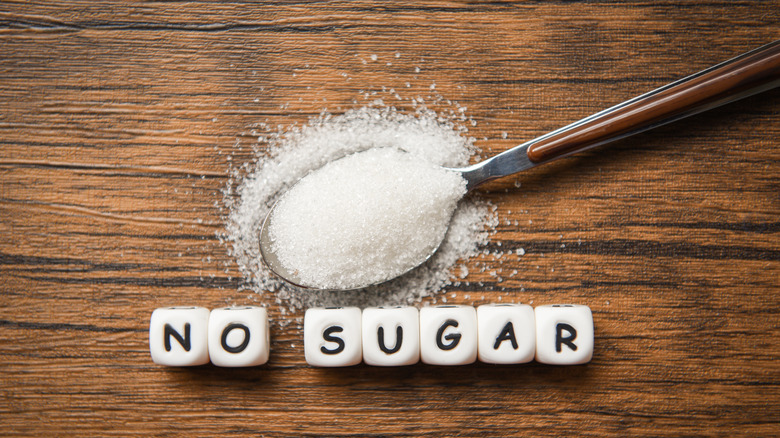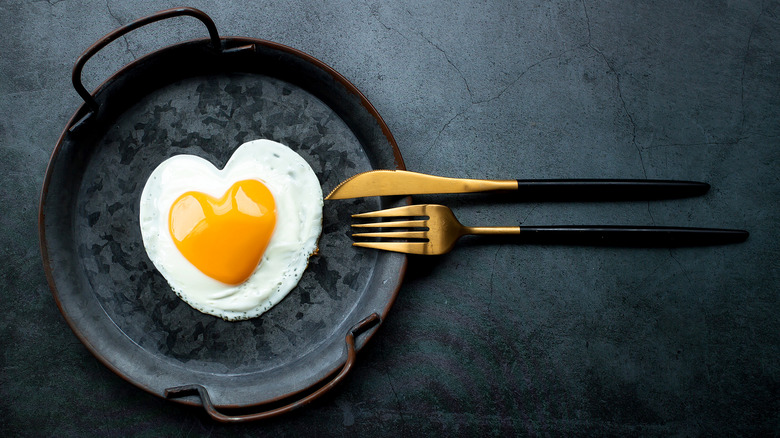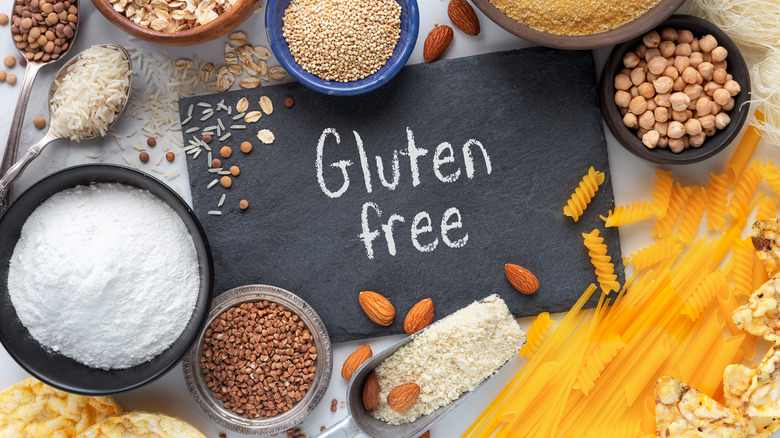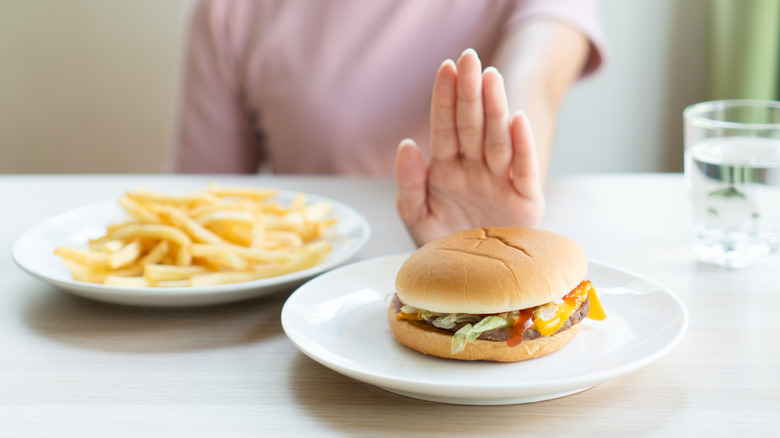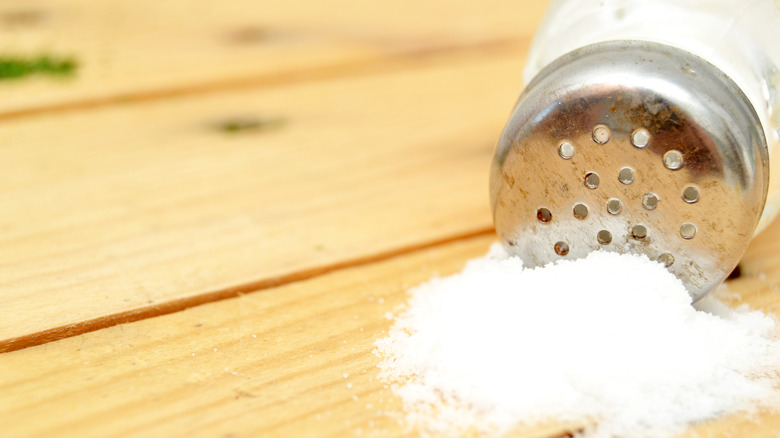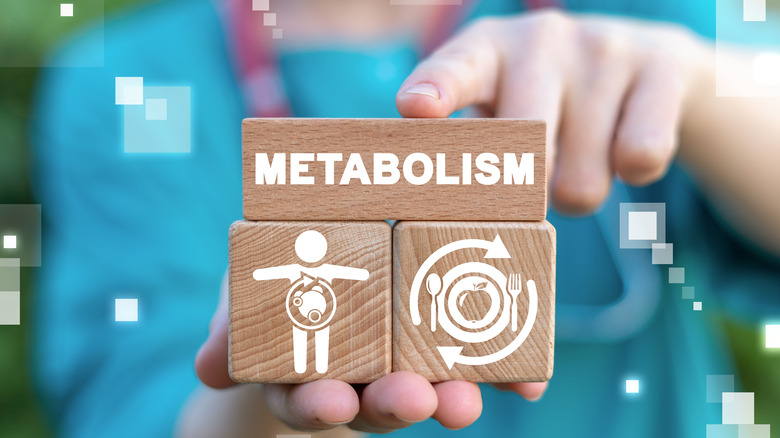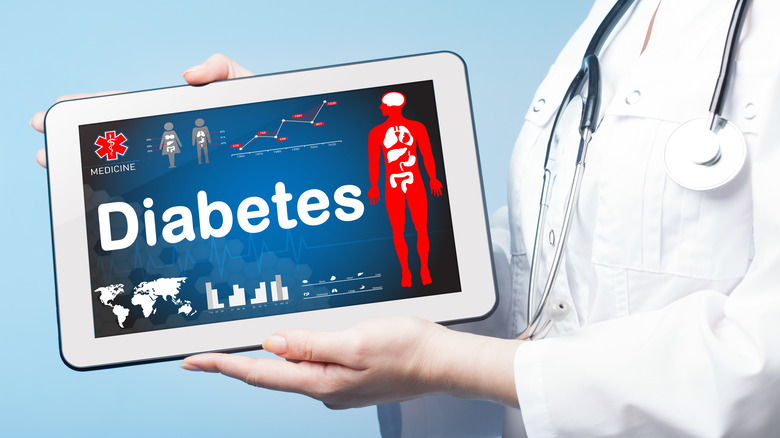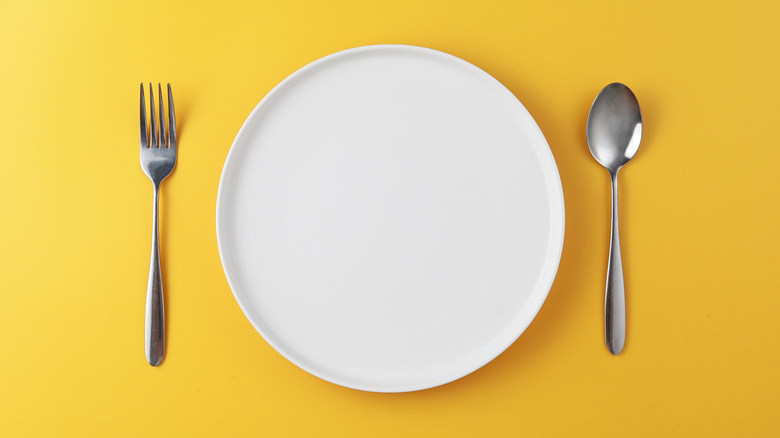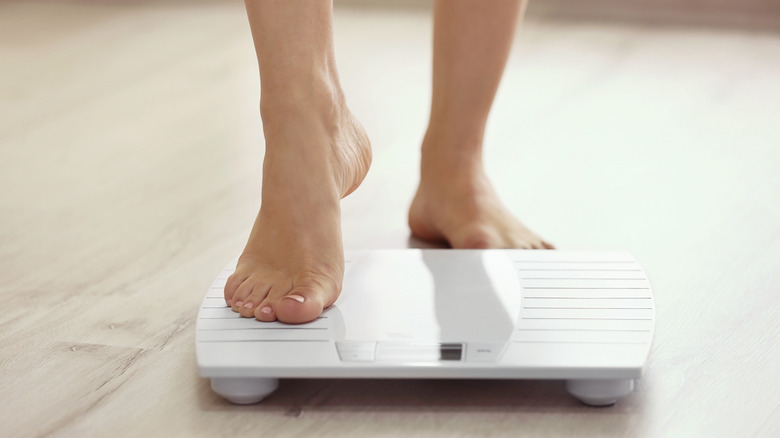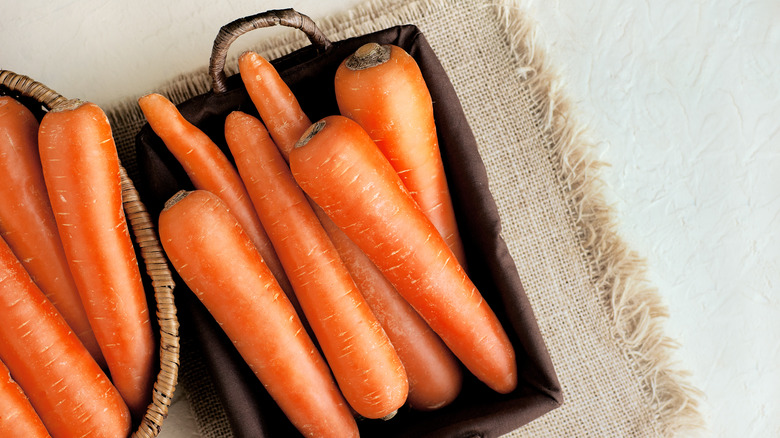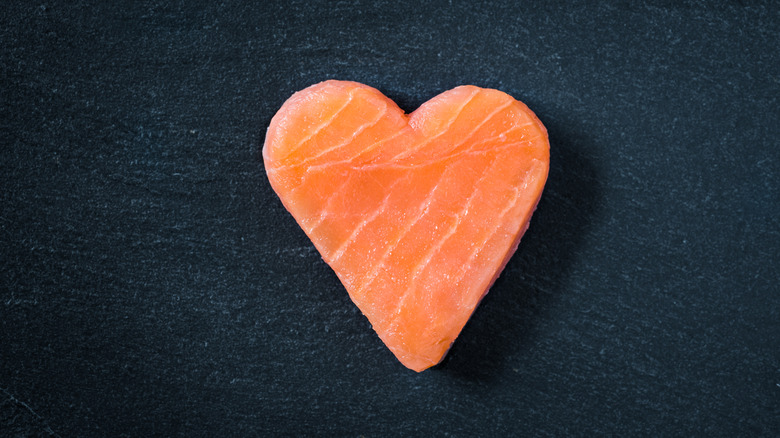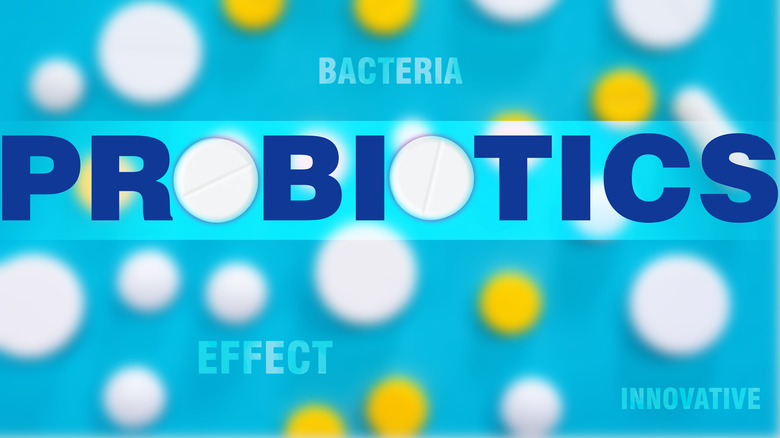Myths About Nutrition You Can Stop Believing
You're at a friend's birthday party when they bring out that calorie-loaded, frosting-covered cake, and, of course, cut a huge slice for everyone. As you accept your piece, you can already feel your gut bursting. But you don't want to be antisocial, and it does look really tasty, so you think, "I'll just do some extra reps at the gym. It'll be like I never ate it." On the surface, that line of thinking makes sense, but like many nutrition myths, it takes something complex and tries to oversimplify it.
As Health explains, calories are just one part of indulging in junk food like cake. No matter how vigorously you work out, you've still consumed a high amount of sugar and salt, which can be terrible for your immune system. And, no, those types of additives don't just disappear with an extra spin class. Plus, that cake is not fueling up your body with the nutrition it needs for exercising, especially if you're ratcheting up the intensity level. It's like putting the wrong type of gas in your car. Not only won't your vehicle perform the way you want it to, but it can actually damage your car's engine and inner workings.
Unfortunately, there are quite a few nutrition myths that seem logical until you start scratching the surface. The good news is, once you're aware of them, you can avoid pitfalls when it comes to your health.
Myth: You should never eat any kind of sugar
When it comes to sugar, we have a real love-hate relationship. On one hand, its taste can be irresistible. And yet, no one likes the side effects of eating too much sugar, like weight gain and energy crashes. So, it's easy to see why cutting out all sugar might seem like a healthy move. This myth, however, doesn't tell the whole story.
As Medical News Today explains, fruits have sugar, as well as important nutrients like fiber, vitamins, and minerals. Potassium, for example, is found in cantaloupes, honeydew melons, and bananas (via The U.S. Department of Agriculture or USDA). If you cut these fruits from your diet, you'd lose this nutrient that can help you maintain your blood pressure. Eliminating all fruits also means taking in less vitamin C, which helps your body heal from injuries like wounds.
So, is there any truth to this myth? Sorry to all the sweet tooths, but yes. The American Journal of Clinical Nutrition published a study linking drinking sugary beverages like soda to type 2 diabetes in men (via Medical News Today). Another study concluded postmenopausal women who drank soda that contained sugar increased their risk of fracturing their hips. But there's one important to keep in mind: quantity. In other words, eating and drinking excessive amounts of sugar can be bad for your health. But maintaining a well-balanced diet that incorporates the right amount and sources of sugar can actually be beneficial.
Myth: If a food is high in fat or cholesterol, it's not healthy
Here's a quick word association game: What's the first thing that comes to mind when you hear "cholesterol"? Now, for the bonus round: What pops into your head when you hear the phrase "foods high in fat"? If you said something negative like "harmful" or "dangerous," you're not alone. After all, consuming cholesterol and fat can cause health problems. But writing off foods solely because of their fat or cholesterol content is not a great idea.
When a food is loaded with cholesterol, that doesn't mean it has no nutritional value. According to the USDA, 19 grams of cooked liver supplies your body with more than half of the Reference Daily Intake for several important nutrients like vitamin B12 and copper (via Healthline). And a standard large, Grade A egg has vitamins E, B2, and B7, as well as the mineral selenium (via USDA and Healthline). So, despite their high cholesterol content, both of these foods are also good sources of important nutrients.
And what about fat? Well, there are a number of fat-rich foods that are not only nutritious but also helpful for maintaining a healthy weight (via Healthline). Take avocados, for example. A study published in Nutrients shares how this high-in-fat fruit is actually good for weight management (via Healthline). And another study in Nutrition Journal found that "a walnut-enriched reduced-energy diet can promote weight loss" despite the fact that walnuts have fat.
Myth: Cutting gluten out of your diet is always a good idea
In "The Angry Birds" movie, Red (played by Jason Sudeikis) asks, "What the heck is gluten? I mean, does gluten even exist?" Well, it certainly does, and with so many gluten-free products on the market, it's not surprising that many assume not eating gluten is a healthy choice. But it's not that simple.
If you're also asking "what the heck is gluten," it's a protein found in certain grains (via National Institute of Diabetes and Digestive and Kidney Diseases or NIDDK). For people who have celiac disease, gluten can trigger an immune response that can do intestinal damage. And even if you don't have this hereditary disorder, it's still possible to have a sensitivity to gluten. So, under these circumstances, it makes sense to opt for gluten-free products. However, gluten has fiber, as well as vitamins and minerals, so cutting it out of your diet, means getting less of these nutrients. Plus, despite popular opinion, the NIDDK states on their website that, "A gluten-free diet is not a weight-loss diet and is not intended to help you lose weight."
If you think you may be sensitive to gluten or have celiac disease, you should keep a food journal where you track not only what you eat but also how you feel in the hours after you eat. This can be invaluable information for your health care professional.
Myth: Want a foolproof way to lose weight? Become a vegetarian
What sounds less fattening: a big, juicy steak or a leafy greens salad? In all likelihood, you picked the salad, and that makes sense. After all, meat (especially red meat) is not exactly the poster food for healthy eating. As one study in Obesity Reviews found, "... red and processed meat intake is directly associated with risk of obesity." So, drawing the conclusion that vegetarianism is the healthier lifestyle that will guarantee weight loss is understandable but unfortunately, not correct.
The hole in this myth is plants are all different, so while some may be good for weight loss, others could actually cause weight gain. And as Medical News Today points out, it's possible to take in thousands of calories a day just from eating plant-based food alone. In fact, a group in the UK called Action on Salt found some meat alternative products marketed to vegetarians were actually loaded with salt and in some cases, were higher in sodium than their traditional meat counterparts (via Medical News Today).
Plant and non-meat products aside, becoming a vegetarian doesn't mean you can skip exercising if you want to lose weight. In short, plants are not a blanketed fix for health issues and weight loss goals. Whatever eating lifestyle you choose, you still need to consider what you're eating and how much you're eating in order for it to be healthy for you.
Myth: Salt is not healthy but easy to cut from your diet
"Salty" is usually not a complimentary word. Calling a person salty implies they're angry or resentful. Calling a food salty is usually what happens just before it's sent back to the kitchen. And with sodium being connected to health issues like high blood pressure (via Cleveland State University), it's no wonder so many want to cut the salt in their diet. But not consuming sodium isn't as easy as throwing out your salt shaker, and frankly, cutting it out entirely is a bad idea.
While eating too much salt isn't healthy, sodium is a type of electrolyte that's important for your brain, heart, muscles, and nerves (via Cleveland State University). Bottom line: you need some salt in your diet in order to function properly. Unfortunately for Americans, processed foods and eating out adds salt to their daily intake (via Mayo Clinic). So, even if you don't add more salt to what you're eating (unless you're careful about your meal choice), you could be loading up your body with extra sodium.
If you do want to consume less salt, the first step is to read food labels. Even if something tastes sweet, don't assume it's low in sodium. And there are foods that can help you deal with your salt cravings while you transition into your healthier lifestyle.
Myth: Eating frequently revs up your metabolism and curbs your appetite
Like many myths, this one is based on a little bit of truth: the thermic effect of food or TEF (via Healthline). In a nutshell, TEF means when you digest, you burn some calories. So, following that line of thinking, the more often you eat, the more revved up your metabolism becomes. Plus, that constant eating means you're less likely to get a case of the munchies, right? Oh, if only this were true.
According to Healthline, while TEF does lead to calories being burned off, it averages out to only about 10% of all the calories you consume. And the more calories you eat, the less that 10% is going to make much of a dent. No matter how you divide them up, how many calories you consume by the time you go to bed is what really matters.
And what about curbing hunger? Well, one study published in Obesity suggests that despite popular opinion about eating smaller meals more frequently, "this practice has no obvious advantages in terms of its effects on metabolism and appetite, and may, in fact, even have adverse effects on hunger and satiety." Yet, another study in the British Journal of Nutrition found that eating three meals a day instead of two "increased satiety feelings" over the course of 24 hours. What this boils down to is increasing how often you eat is not necessarily going to curb your appetite — and what you eat still matters.
Myth: Diabetes and being overweight always go hand in hand
How many types of diabetes are there? If you said two, you're almost right. As Medical News Today notes, there are two main types of diabetes: type 1, where your immune system's natural defenses go after your body's insulin-making cells, and type 2, where your body is both insulin resistant and doesn't produce enough insulin to deal with this resistance. However, researchers have identified a third type that is not only more dangerous but also blows the myth about obesity and diabetes out of the water.
According to a study from the Centers for Disease Control and Prevention or CDC, 12.5% of type 2 diabetics do not have a higher than healthy weight because their condition is caused by autoimmune issues (via Medical News Today). This type of diabetes, which has been dubbed by some as "type 1.5," is more lethal than regular type 2. In fact, a study published in the Journal of the American Medical Association states that "... adults who were normal weight at the time of diabetes incidence experienced higher mortality than adults who were overweight or obese at diabetes incidence."
Whether someone is overweight or not, diabetes in all its forms can be harmful. Ignoring the impact of "high sugar" levels can lead to health issues like stroke, kidney and heart disease, and potentially severe vision complications (via Medical News Today).
Myth: At a certain age, skipping meals won't hurt your health
If you have any older adults in your family, you might notice that they don't seem to have much of an appetite. In fact, they may opt to skip a meal or eat half of what's on their plate and then save the rest for another time. Yet, they seem happy, so it's easy to think that's just part of getting older. But this is where potential problems can begin.
As WebMD notes, when a senior citizen skips a meal, that doesn't mean they won't eat something later. And that burst of appetite can lead to binging on less healthy options. Okay, but what about missing a meal and then eating a large, well-balanced one? Unfortunately, that can also be unhealthy since it can make their blood sugar dip and spike. "The best advice is to always start your day with a healthy breakfast, since appetite is usually best in the morning," says past president of the American Dietetic Association, Nancy Wellman. "Then make sure you eat something at every meal time."
And what about eating half of a meal now and saving the rest as leftovers? Dr. Kathleen Niedert tells WebMD that, "Seniors who get meals delivered to their homes through programs such as Meals-on-Wheels should avoid dividing those meals into two. These meals are usually prepared to give you balanced nutrition. If you divide one meal into two, you can easily fall short on key nutrients."
Myth: Putting your body in ketosis is not safe
This myth is a case of mistaken identity. For anyone unclear about ketosis, it happens when you consume a very small amount of carbs daily (via Healthline). This drives down your insulin levels and forces cells in your body to release fats, which are converted by your liver into molecules that can deliver energy to your brain. Part of the reason we call this ketosis is because these molecules are called ketones. Unfortunately, this is also why ketosis gets confused for ketoacidosis.
Unlike ketosis, ketoacidosis is a sometimes fatal medical condition where a person's bloodstream is so saturated with ketones that it becomes acidic (via Healthline). And unlike ketosis where just about anyone can put their body in that state, ketoacidosis mainly affects people with type 1 diabetes. So, even though both involve ketones, ketosis and ketoacidosis are completely different.
Now that we've cleared up some confusion associated with this myth, you still may be asking "is being in a ketosis state safe?" Well, according to one study published in The Lancet Neurology, the ketogenic diet (which puts one in a ketosis state through strictly regulating the amount of fat, protein, and carbs consumed) may help treat childhood epilepsy. Another study in Redox Biology found this type of diet may help treat cancer. If you want to try the keto diet for yourself, certain foods may help you achieve your goals — but you should always talk with your health care professional before beginning any diet plan.
Myth: If you diet and exercise, you won't be obese
This is a crucial myth to debunk especially since there is some truth to it. Yes, if you consume more calories than you burn off, it can lead to gaining weight (via Medical News Today). And, yes, over time this can lead to obesity. However, if a person is obese, there could be a number of factors outside of diet and exercise that are impacting their weight. And most of them are not simple fixes.
A study in the International Journal of Obesity explains difficulty losing weight can be because of insomnia, depression, and stress. Research has also found that chronic pain can be a contributing factor to obesity since pain can impact sleep. In addition, another study concluded that hormones and prescription drugs can also impact one's weight.
In short, the stigma that a person who is obese just needs to diet and exercise more is not only incorrect but also adds psychological barriers to achieving a healthy weight. The good news is a health care professional can help with chronic pain, insomnia, depression, stress, and other issues that might be interfering with maintaining the best weight for an individual's health. Plus, nutritionists can help you put together the right eating plan that will fit their needs.
Myth: All carbs are bad for your health
Chances are the last time you went to the supermarket or shopped for your groceries online, you saw an item marked "low-carb." From the Atkins diet to the Keto diet to even the South Beach diet, we've married the idea of cutting back on carbs and losing weight. And while skipping some baked goods can help move that number on the scale, there is a problem with lumping all types of carbs into one "bad for you" category.
Refined sugars and carbs like the kind in pastries are very different from the carbs found in some vegetables (via Healthline). Yes, although we associate them with foods like bread, carbs are not limited to the bakery aisle. What's more, Bugs Bunny may have been onto something eating so many carb-filled carrots. As Health explains, this orange root vegetable is good for your eyesight, blood sugar, blood pressure, and immune system. Plus, they can reduce your chances of developing heart disease and cancer.
So, what does all this mean in terms of your eating plan? Well, as Healthline points out, low-carb diets aren't for everyone. It's important to talk to your health care professional before cutting an entire food group out of your meals and snacks. What you may find healthier is cutting out or back on certain foods rather than all the foods in a particular category.
Myth: If you have heart disease, then never eat any kind of fat
You've probably heard someone half-joke that if something tastes good, it must be bad for you. In particular, foods loaded with fat are branded as more satisfying but not healthy. Throw heart disease into that mix, and suddenly fats are not viewed as an indulgence but as almost a poison. But not all fats the same, and some may actually be beneficial for your heart.
Okay, so first, the bad news. Saturated fats like the kind in sausages, butter, and bacon are not good for your heart and should be cut back on if you have cardiovascular disease (via Medical News Today). The same goes for partially hydrogenated and trans fats, which are in goodies like microwave popcorn and baked goods. But there is good news. One study published in the Journal of the American Heart Association found that the polyunsaturated fat called omega-3 may be good for the heart. In fact, the American Heart Association states eating fish and specifically fatty fish (yes, fatty fish) twice a week may help protect your heart since they're loaded with omega-3 fatty acids.
If you're not a fan of fish, you can get omega-3 from supplements, but as Medical News Today notes, supplements do not seem to cut down on your chances of heart issues. But not to worry. Fatty acids can also be found in walnuts, canola oil, and tofu (via the American Heart Association).
Myth: Probiotics are all the same
Bacteria is usually viewed as negative. We buy antibacterial soap. We take antibiotics, which are meant to kill off harmful bacteria in our bodies. But as WebMD explains, we need certain bacteria (referred to as probiotics) to keep our bodies and, in particular, our digestive system functioning normally. So, products that are the polar opposite of antibiotics entered the marketplace, and now, you can replenish the good bacteria in your body through supplements, as well as foods like yogurt. However, just because probiotics can be good for you doesn't mean all probiotics are right for you.
As Healthline explains, there's no guarantee a particular probiotic will have a positive effect on your gut. One study in Microorganisms found that taking probiotics can lead to too much bacteria growing in the small intestine, which can cause issues like gas and bloating. WebMD cautions that probiotics can interact with immunosuppressive drugs and antibiotics. Plus, cancer, HIV, and issues with your intestines and immune system may mean taking probiotics is a bad move for your health.
If you feel like probiotics could be helpful to you, then you need to ask yourself: what do you want them to improve about your health? For example, if you have a vaginal infection, you don't want to take a probiotic that helps with diarrhea (via WebMD). Talking with your health care professional may help you find the right probiotics for you.
Myth: Caffeine isn't healthy, but it's good for sobering up fast
No nutrition myths list could be complete without that popular pick-me-up: caffeine. For many, the day cannot start without caffeine-rich coffee. But despite its dedicated consumer base, caffeine is misunderstood as not checking off boxes in the good health column and being an instant fix for drunkenness. It's time to set the record straight.
According to WebMD, there are findings suggesting that caffeine can help with some headaches, as well as asthma symptoms. Research shows that it also may be beneficial for someone with type 2 diabetes, dementia, liver disease, colorectal cancer, and Parkinson's disease. Now to be fair, WebMD does caution that more research needs to be done on the possible positive impact of caffeine. However, the current data does move caffeine from the "no health benefits" category to the "potential health benefits" one.
And what about caffeine as a fast way to sober up? As WebMD explains, that's a hard no. This part of the caffeine myth is dangerous because it implies that caffeine can counteract the effects of alcohol. In other words, a person believing this myth might think if they drink beer but follow it up with coffee, they're safe to drive because the coffee's caffeine will prevent the alcohol from impairing their senses. But the exact opposite is the truth. Evidence indicates that college students who consume both caffeine and alcohol are increasing their chances of getting into an accident behind the wheel.


